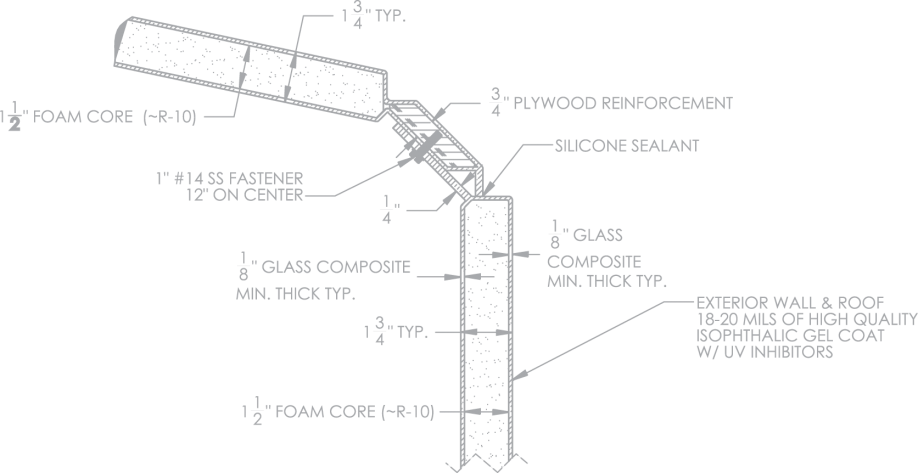High-Performance Composites for Eco-Friendly Building
High-Performance Composites for Eco-Friendly Building
Blog Article
Discovering the Uses and Advantages of Recycled Composites in Modern Industries
The amalgamation of recycled products with innovative composite modern technologies presents a promising avenue for boosting sustainability, durability, and cost-efficiency across various markets. As sectors look for innovative remedies to deal with environmental worries and boost functional efficiencies, the consolidation of recycled compounds arises as an engaging alternative.
Ecological Advantages of Recycled Compounds
The utilization of recycled composites in contemporary markets uses considerable environmental advantages, contributing to the reduction of waste and the preservation of natural resources. By incorporating recycled composites into manufacturing processes, industries can decrease their dependence on virgin products, therefore reducing the amount of waste generated and the energy needed for removal and manufacturing. This shift towards using recycled compounds aids in drawing away products from landfills, reducing the burden on waste management systems, and decreasing greenhouse gas exhausts linked with standard production practices.
Moreover, the usage of recycled composites promotes the preservation of natural deposits such as timber, minerals, and water, which are often diminished through the removal and handling of resources (composites). By extending the life-span of materials through recycling, industries can help maintain environments and biodiversity by reducing the need for brand-new resources. On the whole, the fostering of recycled composites in contemporary sectors plays a critical role in advertising sustainability and reducing the ecological effect of manufacturing processes
Improved Toughness in Product Production
With a concentrate on longevity and effectiveness, incorporating recycled compounds into product manufacturing procedures enhances sturdiness and sustainability. By making use of recycled compounds, suppliers can create items that are not only strong however also resistant to tear and wear, making them ideal for long-term usage in different industries. The mix of various materials in recycled compounds can commonly result in improved strength and durability contrasted to conventional products, giving a cost-efficient remedy for creating resilient products.
One of the key benefits of using recycled composites in item manufacturing is the capability to customize the product residential or commercial properties to meet specific longevity needs. By adjusting the structure and manufacturing strategies, manufacturers can personalize the recycled compounds to endure harsh ecological conditions, heavy lots, or regular usage without endangering on efficiency. This flexibility in layout and manufacturing enables the development of extremely durable products that keep their honesty in time, lowering the demand for constant replacements and eventually contributing to a more sustainable production process.
Cost-Effectiveness and Financial Advantages
Incorporating recycled compounds right into product manufacturing not just boosts durability and sustainability however additionally provides considerable cost-effectiveness and financial benefits. Making use of recycled composites can bring about minimized product costs as recycled materials are usually more economical than virgin products. In addition, reusing composite products can decrease Visit This Link waste disposal costs and reduce the demand for land fill space, contributing to total price financial savings for sectors.

Advancement and Style Flexibility With Recycled Compounds
Making use of recycled composites in modern sectors uses unparalleled possibilities for advancement and design flexibility. By incorporating recycled products into composite production processes, firms can press the boundaries of standard design restraints and explore brand-new opportunities. The adaptability of recycled composites permits for the development of intricate shapes and structures that could not be attainable with standard materials.
Among the key benefits of recycled composites is their capacity to be molded right into various types, this contact form giving developers the freedom to trying out one-of-a-kind sizes and shapes. composites. This versatility opens up a world of imaginative opportunities, making it possible for the development of light-weight yet long lasting items that meet the certain demands of different markets
Additionally, the usage of recycled composites promotes sustainable techniques and sustains the circular economic situation by minimizing waste and decreasing the environmental impact of producing processes. This focus on eco-friendly layout solutions aligns with the growing pattern towards sustainability in modern markets, making recycled composites a beneficial source for forward-thinking and cutting-edge companies.
Applications Across Numerous Industries
Recycled composites find impactful and diverse applications across a variety of sectors as a result of their unique residential or commercial properties and sustainability benefits. In the vehicle market, these products are significantly made use of for making lightweight and durable components, enhancing gas efficiency and decreasing carbon discharges. The aerospace industry gain from recycled compounds in the manufacturing of airplane components, where the products' strength-to-weight ratio is important for making certain safety and security and efficiency. In construction, these compounds are made use of for producing strong yet environmentally friendly building materials, adding to lasting framework advancement. The renewable power sector employs recycled compounds in wind turbine blades and solar panels, using their stamina and resistance to harsh environmental conditions. Additionally, the aquatic market utilizes these products for producing boat hulls and parts, offering boosted resilience and corrosion resistance. The convenience and sustainability of recycled compounds make them important across various sectors, driving advancement and environmental stewardship. composites.
Verdict
Finally, the usage of recycled compounds in modern industries uses substantial environmental advantages, enhanced durability in product production, cost-effectiveness, and financial benefits. In addition, the use of recycled composites enables advancement and layout flexibility across numerous sectors. her response On the whole, the adoption of recycled composites presents a sustainable and sensible remedy for satisfying the needs of the market while also minimizing ecological impact.

One of the key advantages of making use of recycled compounds in product production is the capability to tailor the product residential or commercial properties to meet details longevity needs. Using recycled compounds can lead to reduced product expenses as recycled materials are typically less costly than virgin products. The aerospace market advantages from recycled composites in the manufacturing of aircraft components, where the materials' strength-to-weight proportion is critical for making sure safety and efficiency.
Report this page